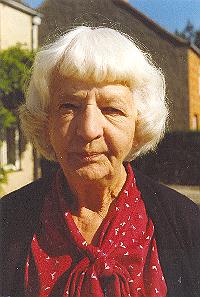|
|
 |
Marjorie Noble
MBE
1911-2003
A REMARKABLE LADY
|
The lasting legacy of Marjorie Noble is her fascinating book Thurlby: an ordinary village, lovingly detailing the life and times of this small community, two mile south of Bourne, from the earliest times to the present day and published in 1987 to local acclaim.
But apart from her own writing, a less well known aspect of her remarkable life was in helping to bring books to the more deprived areas of the world through her work for the British Council, an independent non-political organisation set up in 1934 to promote British culture, the teaching of English and a knowledge of the United Kingdom abroad.
Marjorie Noble was born at Thurlby in 1911, the daughter of John Elwes Noble, a
well-known artesian well borer, and was the third of four sisters. After attending Bourne Grammar School, she began work as a librarian in Peterborough at the age of 17, later moving to widen her experience at Kettering, Faversham and Nottingham. But she always had an adventurous spirit and in 1937, she cycled around Holland, undeterred by the prospect of war looming. By 1944, she had joined the British Council as a librarian and was posted to Cairo, crossing the Mediterranean at the height of the Second World War in a convoy.
Her subsequent travels took her to many exotic locations including Uganda, New Zealand, Turkey and Greece, working with both the British Council and the United Nations, setting up library facilities in remote places and in 1972, she was awarded the MBE for services to Britain overseas, notably her work in Indonesia.
In 2003, her nephew John Cappitt, of Northorpe, near Thurlby, remembered the excitement of hearing from his aunt as she travelled the world. "She wrote home to her mother every week", he said, "sending us wonderful things like parasols and toys from Indonesia. During the war, when food was short in this country, she kept her mother supplied with food parcels that she sent from such places as New Zealand. They would contain all manner of things like honey and lemons that we could never get over here. She also had one or two hair-raising adventures such as the time her driver was beaten up in Uganda. Somehow, she always seemed to go to those places where there was political unrest or trouble of some sort. She had a lot of courage in a male-dominated environment, travelling and working across the world on her own, journeying through the Suez and Panama canals and she always came home with really good stories to tell."
On retiring in 1973, Miss Noble moved to Collyweston, near Stamford, before returning to her home village, living at a house in Crown Lane that had been built to her own design. The plans were later published in the Ideal Home magazine.
The book was her major project in retirement and embraced the geological, religious and social history of the village, combining testimonies, photographs and drawings from past centuries and as well as her writing, she also pursued an active interest in archaeology as a member of the Stamford Archaeology Society and paying frequent visits to Flag Fen, the Iron Age village being excavated at Peterborough.
She was also an accomplished musician, playing the piano with some ability, and was a keen gardener and collector of arts and crafts, particularly from those countries she had visited in the course of her work, and maintained a loom room in her house where she would spin and weave her own fabrics. She also made her own preserves and beverages.
Marjorie Noble never married but was devoted to her family and enjoyed spending time with her many close relatives, including six nieces and nephews and their children who were all reunited for her 90th birthday in 2001.
She died on Saturday 22nd February 2003, aged 92, at the Seacroft Nursing Home in Skegness where she spent the last months of her life. "She was in excellent health right until near the end", said her niece, Mrs Jane Turner. "She was a great believer in complementary medicine and ate virtually no meat."
During her life, Marjorie Noble valued friendship and kept visitors' books with a record of everyone who ever went to see her. They dated back more than 50 years to the time when she lived abroad and when she had friends in many different places and walks of life. They have been retained by the family as a reminder of this remarkable woman.
For details of John Elwes Noble see
Water boreholes in and around Bourne
Return to Thurlby

Go to:
Main Index Villages
Index
|
